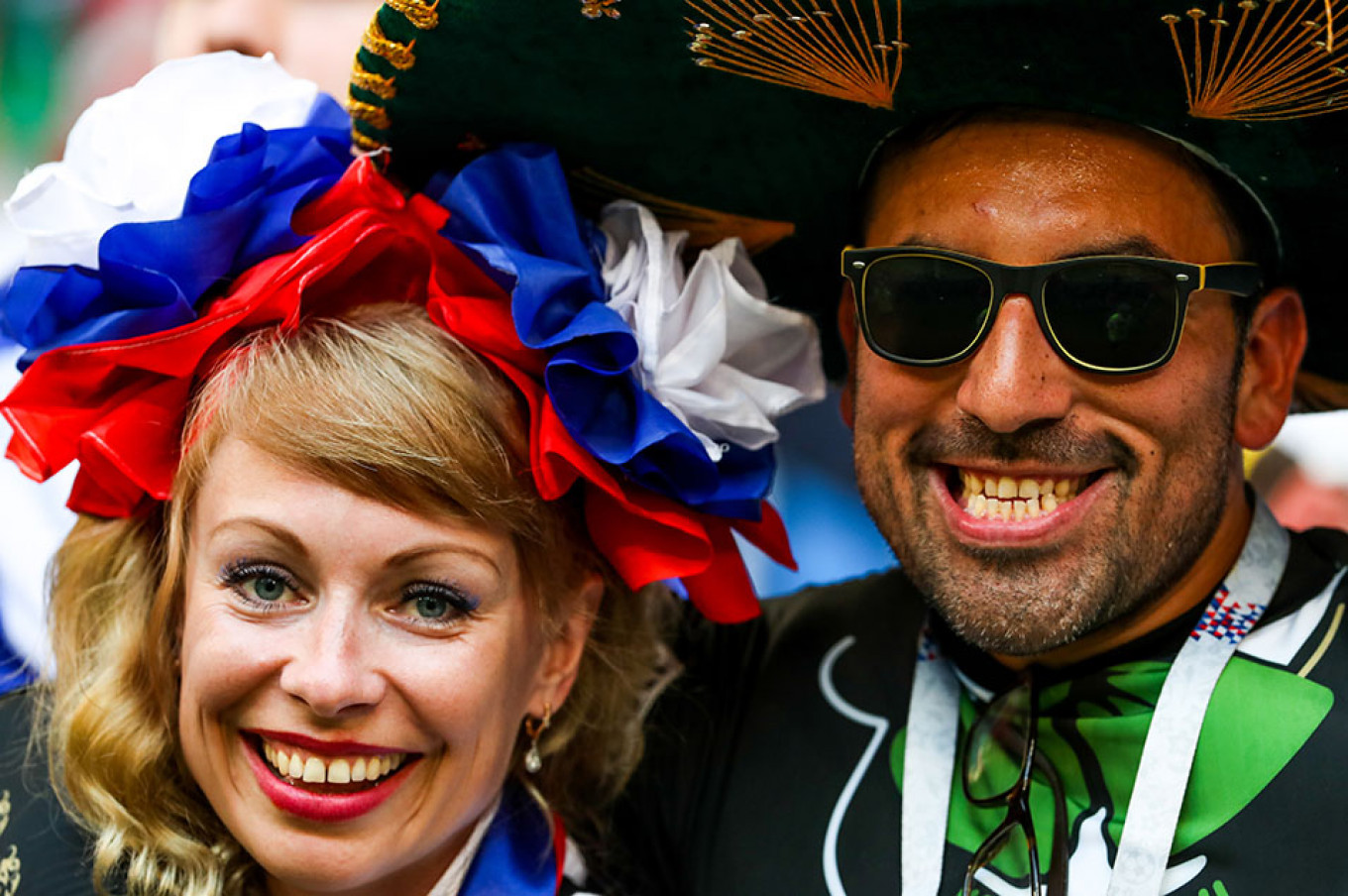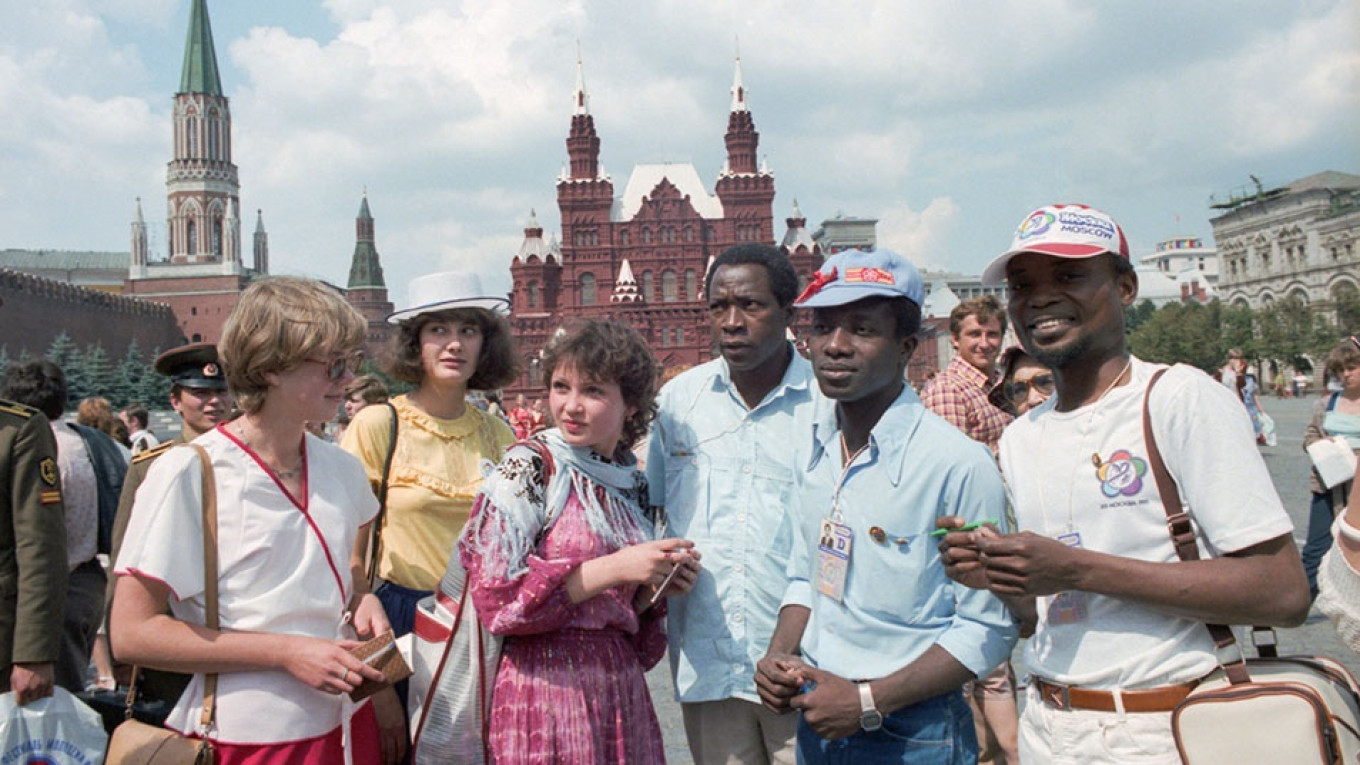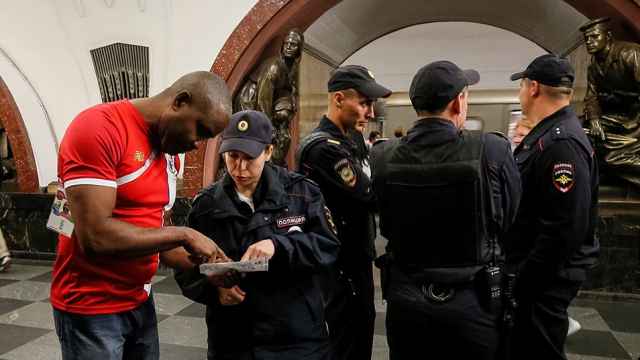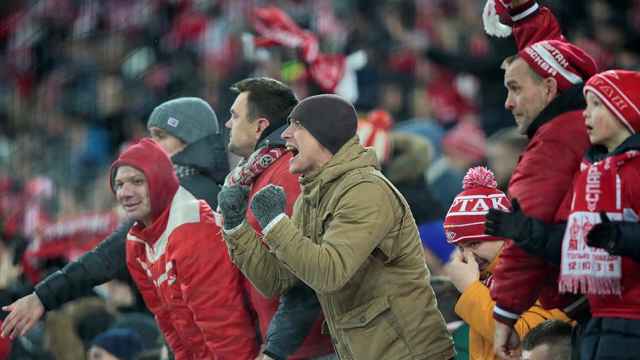Sometime in the late 1960s, Irina Filatova was on the Moscow metro with a Senegalese classmate and his daughter.
The two had met in a Swahili class at the Institute for Asian and African Countries at Moscow State University, where Filatova was studying history.
On the way home, she noticed a young Russian man staring at them. She tried to ignore him, but when they arrived at her station, the man jumped from his seat and yelled for everyone to hear: “Girl, have you no shame?”
“That was the attitude at the time,” Filatova sighed, recalling the event. “My cousin told me that if she ever saw me with a black person she would never speak to me again. My father warned me that friendships with people of color were one thing, but relationships were entirely another.”
It’s OK if they are of the same race. But if they are of another race, then that’s something entirely different.
Five decades on, just as the World Cup was kicking off, comments made by a State Duma deputy during an interview with the Govorit Moskva radio station reminded her of that incident.
“We must give birth to our own,” Tamara Pletnyova, the head of the Committee on Children, Women and Family, said on air, warning Russian women against getting too friendly with foreign fans. “It’s OK if they are of the same race. But if they are of another race, then that’s something entirely different.”
Pletnyova said she had personally met some of the “suffering” single mothers left behind after the 1980 Olympic Games in Moscow and argued that a repeat would be bad for the country. She was not alone in that belief.
As the tournament got underway, it became clear that many in Russia shared the lawmaker’s concerns. While foreign football fans flooded Russian streets and cities, commenters on social media shamed local women for fraternizing with Moroccans, Nigerians and Mexicans. They warned of the crisis that would materialize nine months down the line.
This sense of anxiety is not new. In fact, mixed-race children born to Russian mothers after international events in Russia have their own term: deti festivalya, or “festival children.”
The term dates back to the 1957 World Festival of Youth and Students, when thousands of students from around the world flocked to Moscow for the two-week cultural fair. For most young Muscovites, it was the first time they had met anyone from Africa, Latin America or East Asia.
Just four years after the death of Stalin, the event was a departure from the Soviet Union’s previous isolation.
“The festival is considered to be the signal event of the Thaw,” Kristin Roth-Ey, a historian at University College London, told The Moscow Times. “Just a few years earlier, marriage to foreigners of any kind was illegal. To go from that to throwing open your doors to 40,000 visitors from around the world is a radical change.”
Photos from 1957 show crowds of young Russians dancing in the streets with students from all over the world. In more intimate moments, Russians and non-Russians were captured sitting on benches together or sharing a meal, giddily smiling.
“We have all these firsthand accounts of joy — [locals] joyfully going up to foreigners of all races on the streets and embracing them,” Roth-Ey said. “Forget the sexual element of it — [it was] just unrestricted jubilation.”
Soon enough, however, rumors swirled that Russian girls were sleeping with foreign men. “Of course there was a lot of sex during the festival,” Filatova told The Moscow Times. “It was the first time the Soviet Union had seen so many foreigners, particularly from African and Latin American countries.”
It became a commonly accepted belief that, nine months later, Russian girls were giving birth to babies of African, Latin American and East Asian origin, the so-called deti festivalya.
The phenomenon of the children went on to gain a life of its own in popular culture. Lyudmila Ulitskaya’s 2010 novel “The Big Green Tent,” a reflection on Moscow in the 1950s, makes explicit reference to the festival and its resulting “brownskinned babies.”
The cult musical-comedy film “Stilyagi,” from 2008, follows the lives of a young group of Muscovites and their love for Western culture. One of the main characters, Polly, gives birth to a mixed-race baby boy. Actual statistics on mixed race births after the festival, however, are difficult to find. A handful of studies all proved futile. “Clearly there were some children who emerged from that, but nothing like what the popular sensibility suggests,” Roth-Ey said.
A multicultural union
For many Russians looking back on the 1957 festival today, deti festivalya are evidence of Soviet internationalism and racial tolerance. “My Russian friends and colleagues point to those liaisons as proof that the Soviet Union was a racially tolerant country,” Raquel Greene, assistant professor of Russian at Grinnell College, told The Moscow Times.
The early Soviet Union presented itself as a champion of multiculturalism, in opposition to the racism and nationalism that Soviet authorities said was rampant in the capitalist United States.
Experts who spoke to The Moscow Times pointed to the 1936 film “Tsirk” as one of the strongest illustrations of this. In the film, a white American woman named Marion Dixon comes to Moscow with her black baby. Having fled bigotry in the United States, Dixon decides to stay in the Soviet Union with her child.
After Stalin came to power, however, things changed. In 1947, the Soviet authorities passed a decree banning marriages between Soviet citizens and foreigners. Upon Stalin’s death in 1953 the law was reversed, but the prejudices that informed it remained, targeting women in particular. “Women are seen — cross-culturally — as the embodiment or repository of the nation’s honor,” Roth-Ey explained. “It’s not unique to the Soviet Union and it’s not unique to Russian culture.”

What was unique to the Soviet case, she said, was how fears of racist paranoia over women’s bodies so clearly contradicted the overarching internationalist principle.
This became especially palpable from the 1960s onwards, when the Soviet Union welcomed students from Africa, East Asia and Latin America to work or study.
In 1960, the People’s Friendship University of Russia was founded by Nikita Khrushchev and the number of people of color living in Moscow increased. The deti festivalya myth ballooned at the same time, and anyone who was of mixed race was lumped under that umbrella, especially after the 1980 Olympics were held in Moscow.
“I know a bunch of people who are referred to as ‘children of the Olympics’ or ‘festival children,’” Joyce Kuaovi, a journalist and graduate student told The Moscow Times. Kuaovi has a Russian mother and father, but her paternal grandfather is from Togo. “My father is considered to be a festival child, while his father actually came to Russia to study and stayed here for a number of years in the 60s.”
But under perestroika and glasnost, the term took on a more negative connotation as underlying racism bubbled to the surface.
“During the liberal period of the 1990s, many racists emerged in Russia. Now people could speak really openly about what they thought about other people,” Yekaterina Demintseva, a sociologist at the Higher School of Economics, told The Moscow Times.
Kuaovi recalled the more direct racism that her mixed-race family faced in the 1990s, a period which she described as “very hard.”
“My parents and I were sometimes insulted, our car was once smashed with a club — in hard times it is easier to blame those who are different.”
Learning racism
With a growing sense of Russian nationalism in recent years, the deti festivalya myth has once again taken on a new significance. “Discourse really changed after the annexation of Crimea in 2014,” Demintseva said.
“We have a new enemy, and this enemy is Western people. Western people are not only thought of as people from Europe or the United States — it is anyone who is not from Russia.”
Kuaovi has also noted an escalation in bigotry from officials. She found that these attitudes have become especially explicit around the World Cup.
“Hate speech — and I believe Ms. Pletnyova’s comments are just that — is not new among Russian politicians,” she told The Moscow Times. “[But] I could not imagine such a racist speech coming from the State Duma, especially just before the World Cup we are hosting.”
When called for comment on this article, Pletnyova’s assistant said that she had nothing more to say about the issue and hung up.
Racism towards Russians of color is especially prevalent in schools, says Demintseva.
While working on a study on migrant children in Russian schools last year, Demintseva said one teacher invited a student to a focus group solely because she had a Vietnamese father.
“The girl grew up in a Russian family, she’d never been to Vietnam. But the teacher of this class invited her as if she were a migrant.”
Experts pin this racism down to a desire to develop a Russian nation. “The problem is the Russian project,” Demintseva said.
“People think that if a Russian girl has children with someone who isn’t Russian, the children are not really Russian, either. That’s a big problem for the country.”
A Message from The Moscow Times:
Dear readers,
We are facing unprecedented challenges. Russia's Prosecutor General's Office has designated The Moscow Times as an "undesirable" organization, criminalizing our work and putting our staff at risk of prosecution. This follows our earlier unjust labeling as a "foreign agent."
These actions are direct attempts to silence independent journalism in Russia. The authorities claim our work "discredits the decisions of the Russian leadership." We see things differently: we strive to provide accurate, unbiased reporting on Russia.
We, the journalists of The Moscow Times, refuse to be silenced. But to continue our work, we need your help.
Your support, no matter how small, makes a world of difference. If you can, please support us monthly starting from just $2. It's quick to set up, and every contribution makes a significant impact.
By supporting The Moscow Times, you're defending open, independent journalism in the face of repression. Thank you for standing with us.
Remind me later.






